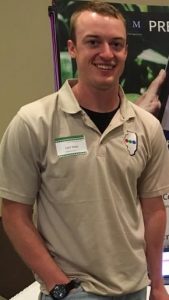PepsiCo, Mars Petcare, The Nature Conservancy, and The Illinois Council of Best Management Practices all have their individual sustainability goals and are offering cost share incentives to farmers in Illinois. Mars and Pepsi’s main goal is to lower their greenhouse gas emissions and believe cover crops are one solution towards achieving this. They committed support toward their sourcing regions (Vermilion County for Pepsi and Coles County for Mars) and designated impact areas (Dewitt, Macon, and Piatt counties for TNC). However, they obviously know they can’t knock on a farmer’s door and ask “hey, could you lower your greenhouse gas emissions for us?” and they also know their solution of cover crops aren’t free.
Mars and Pepsi created a financial incentive pool of $120,000 to farmers planting cover crops on 12,000 new acres this fall. To recruit those farmers and acres, Mars and Pepsi had the Sustainable Food Lab contact Precision Conservation Management (PCM), who became the direct connection, boots on the ground guide for the farmers. PCM Specialists had names on flyers and emails, used personal contacts and references, and made hundreds of cold calls to stir up enough interest. PCM also used Pepsi’s sourcing elevators, Frito Lay and Bunge, to contact producers and Total Grain Marketing elevators who source to Mars throughout Coles County and their related retailer South Central FS for contacts.
After three months of hard work and conference calls, 56 farmers planted 9,015 acres of cover crops this fall. If we fall short of 12,000 acres, that leftover money will roll over to next year and PCM will start assisting farmers during the summer to create fail-proof plans immune to strange fall weather and a drawn-out harvest. Bonus for the farmer: they are paid $500 by PCM for enrolling into the program. And if $500 in addition to a $10/acre cover crop incentive isn’t enough, in February, their PCM Specialist will deliver an individualized RAAP (Resource Analysis and Assessment Plan) with data that shows cover crops will improve a producer’s bottom line by $13 when planted ahead of corn and $16 when planted ahead of soybeans.
In addition to an update this spring regarding this newly formed relationship, also look for a video of drone footage captured this cover crop season by PCM.
Clay Bess
East-Central PCM Specialist
